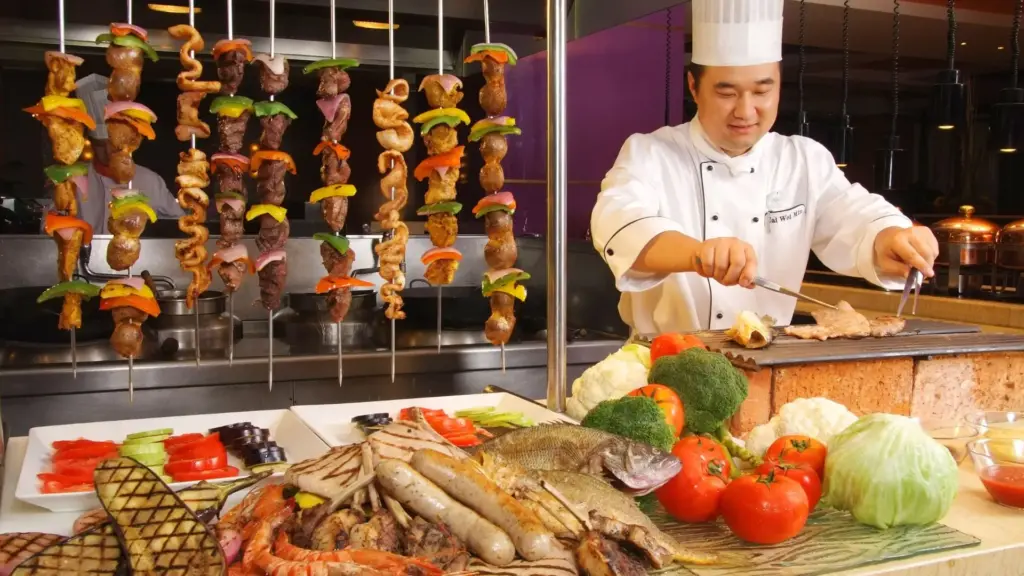In 2024, the competition in the restaurant industry is fiercer than ever. Your restaurant’s online presence can make or break your success. So, how do you ensure your restaurant stands out in search engine results? The answer lies in effective SEO strategies. Don’t worry if you’re not an SEO expert. We’ll break down everything you need to know in simple terms in this “Top Restaurant SEO Strategies for 2024” blog post
Table of Contents
Before we dive into the top Restaurant SEO strategies for 2024, let’s address the following: why SEO matters for restaurants, the impact of SEO on a restaurant’s success, and understing the basics of restaurant SEO.
Why SEO Matters for Restaurants
Search Engine Optimization (SEO) is the process of improving your website to increase its visibility when people search for food, dining, or restaurants online. Better visibility means more traffic to your website, which can lead to more customers walking through your doors.
The Impact of SEO on Restaurant Success
In today’s digital age, more people are turning to the internet to find their next meal. Whether they’re looking for a place to dine tonight or researching the best spots for their upcoming vacation, potential customers are using search engines to make their decisions. If your restaurant doesn’t appear in these searches, you’re missing out on a significant number of customers.
SEO helps bridge this gap. By optimizing your online presence, you can ensure that when people search for restaurants like yours, your business is prominently displayed. This increased visibility translates directly into more foot traffic, higher reservation rates, and ultimately, greater revenue.
Understanding SEO Basics
Before diving into the strategies, it’s essential to understand some basic SEO concepts. Here are a few key terms:
- Keywords: These are the words or phrases people type into search engines. For restaurants, these might include “best Italian restaurant in [City]” or “vegan-friendly restaurants near me.”
- On-Page SEO: This refers to optimizing the content and HTML source code of a page. It includes elements like title tags, meta descriptions, and keyword usage within your content.
- Off-Page SEO: This involves external factors like backlinks from other websites. It encompasses activities that drive traffic to your site from outside sources.
- Local SEO: This focuses on optimizing your online presence for local searches. It includes managing your Google My Business profile and acquiring local citations.
Now, let’s dive into the top restaurant SEO strategies for 2024 you can utilize to increase your restaurant online presence and grow your business.
Top Restaurant SEO Strategies for 2024
1. Optimize Your Google My Business Profile
Your Google My Business (GMB) profile is crucial. It’s often the first thing potential customers see when they search for your restaurant.
- Claim and Verify Your GMB Listing: Ensure your business information is accurate. This process is simple and provides control over your business details.
- Complete Your Profile: Fill out all the details, including hours, address, and contact info. The more information you provide, the easier it is for customers to find you.
- Add High-Quality Photos: Showcase your menu, interior, and events. Photos make your listing more attractive and give customers a glimpse of what to expect.
- Collect and Respond to Reviews: Encourage satisfied customers to leave reviews and always respond to them, whether positive or negative. This engagement shows that you care about customer feedback.
- Regularly Update Your Information: Keep your business hours, phone number, and other details current to avoid confusing potential customers.
2. Focus on Local SEO
Local SEO is essential for restaurants. People often search for places to eat nearby.
- Use Local Keywords: Include your city or neighborhood in your keywords. For example, “best pizza in Brooklyn.”
- Create Location-Specific Content: Write blog posts about local events or partnerships. Highlighting your community involvement can attract local customers.
- Get Listed in Local Directories: Ensure your restaurant is listed on Yelp, TripAdvisor, and other local directories. These listings can drive traffic to your website and improve your local SEO.
- Engage with the Local Community: Participate in local events, sponsor local teams, or host community nights. These activities not only enhance your local presence but also provide opportunities for backlinks and local mentions.
3. Optimize Your Website
A well-optimized website is the backbone of your SEO strategy.
- Mobile-Friendly Design: Ensure your website looks good on mobile devices. Many customers search for restaurants on their phones, so a mobile-friendly site is crucial.
- Fast Loading Speeds: Compress images and use fast hosting. Slow websites can frustrate users and hurt your SEO.
- Use Relevant Keywords: Include keywords naturally in your content, titles, and meta descriptions. Don’t overstuff keywords; focus on readability.
- Create Quality Content: Write blog posts about your cuisine, recipes, and dining experience. Sharing stories and insights about your restaurant can engage customers and improve your SEO.
- Include Clear Calls to Action: Guide your visitors on what to do next, whether it’s making a reservation, viewing the menu, or signing up for a newsletter.
- User-Friendly Navigation: Make it easy for visitors to find what they’re looking for on your site. An intuitive navigation structure can enhance user experience and improve SEO.
4. Utilize Social Media
Social media can drive traffic to your website and improve your SEO.
- Post Regularly: Share updates, special offers, and events. Consistent posting keeps your audience engaged.
- Engage with Your Audience: Respond to comments and messages. Building relationships with your followers can increase loyalty.
- Use Hashtags: Include relevant hashtags to increase your reach. Hashtags make your posts discoverable to a broader audience.
- Link to Your Website: Direct followers to your website for more information or reservations. Social media can be a powerful tool to drive traffic to your site.
- Share User-Generated Content: Encourage customers to share their experiences and repost their content. This not only engages your audience but also acts as free advertising.
- Run Social Media Contests: Engage your audience by hosting contests and giveaways. This can increase your visibility and attract new followers.
5. Leverage Online Reviews
Online reviews can significantly impact your SEO.
- Encourage Reviews: Ask happy customers to leave reviews on Google, Yelp, and TripAdvisor. Positive reviews can boost your reputation and attract new customers.
- Respond to Reviews: Show that you value customer feedback by responding promptly. Thank customers for positive reviews and address any concerns in negative reviews.
- Monitor Your Reputation: Use tools to track and manage your online reputation. Keeping an eye on reviews helps you stay proactive in managing your brand image.
- Highlight Positive Reviews: Share glowing reviews on your website and social media channels to build trust with potential customers.
6. Implement Schema Markup
Schema markup helps search engines understand your website content better.
- Use Restaurant Schema: Add structured data to your website to highlight important information like your menu, hours, and location. Schema markup can make your website stand out in search results.
- Rich Snippets: Schema can create rich snippets, making your listing more attractive in search results. These snippets can include photos, ratings, and other relevant information.
- Improve Click-Through Rates: Enhanced listings with rich snippets can attract more clicks, leading to higher traffic and better SEO performance.
7. Create High-Quality Backlinks
Backlinks from reputable websites can boost your SEO.
- Partner with Local Influencers: Collaborate with food bloggers and influencers. Influencers can share your restaurant with their followers, driving traffic to your website.
- Submit Guest Posts: Write articles for local blogs or news sites. Guest posting can increase your visibility and build your authority in the industry.
- Get Featured in Local News: Host events or participate in community activities to get media coverage. Local news features can provide valuable backlinks to your site.
- Exchange Links with Complementary Businesses: Partner with nearby businesses to exchange links. This can create mutually beneficial relationships and improve your local SEO.
8. Optimize for Voice Search
Voice search is becoming more popular. People often use it to find restaurants.
- Use Conversational Keywords: Include phrases people might speak rather than type. For example, “Where can I find vegan restaurants near me?”
- Focus on FAQs: Answer common questions about your restaurant in your content. This can help you rank for voice search queries.
- Create Content Around Natural Language Queries: Think about how people talk and structure your content to match these natural language patterns.
9. Regularly Update Your Content
Search engines favor websites with fresh content.
- Update Your Menu: Reflect seasonal changes and specials. Keeping your menu current can attract returning customers.
- Write Blog Posts: Share stories about your restaurant, recipes, or industry news. Regular blog posts can keep your audience engaged and improve your SEO.
- Refresh Old Content: Update older posts with new information. This can improve your SEO and provide valuable information to your readers.
- Create a Content Calendar: Plan your content updates and new posts to ensure consistent activity on your website.
10. Monitor and Analyze Your SEO Performance
Use tools to track your SEO efforts and adjust as needed.
- Google Analytics: Monitor your website traffic and user behavior. Understanding how visitors interact with your site can help you make informed decisions.
- Google Search Console: Check your site’s search performance and fix issues. This tool provides insights into how Google views your website.
- SEO Tools: Use tools like SEMrush or Moz to analyze your SEO strategy. These tools can help you identify opportunities for improvement.
- Regular SEO Audits: Conduct periodic audits to assess your website’s performance and identify areas for optimization.
Practical Tips for Restaurant Owners
Implementing SEO strategies can seem overwhelming, but taking small steps can make a big difference.
- Start with Google My Business: It’s free and has a significant impact. Completing your GMB profile can improve your local SEO and attract more customers.
- Focus on Local SEO: It’s the most relevant for attracting nearby customers. Using local keywords and creating location-specific content can boost your visibility.
- Invest in a Good Website: A mobile-friendly and fast-loading site is crucial. Your website is often the first impression customers have of your restaurant.
- Engage on Social Media: It’s a great way to connect with your audience and drive traffic. Social media can also improve your SEO by driving traffic to your site.
- Ask for Professional Help: If SEO feels too complex, consider hiring a professional. An expert can help you develop and execute an effective SEO strategy.
Common SEO Mistakes to Avoid
Avoid these pitfalls to ensure your SEO efforts are effective.
- Ignoring Mobile Users: Most people search for restaurants on their phones. Ensure your website is mobile-friendly.
- Using Irrelevant Keywords: Keywords should match what your potential customers are searching for. Avoid keyword stuffing and focus on relevant terms.
- Neglecting Reviews: Online reviews are crucial for your reputation and SEO. Encourage satisfied customers to leave reviews and respond to them.
- Overlooking Content Updates: Keep your content fresh and relevant. Regularly updating your content can improve your SEO and keep your audience engaged.
- Neglecting Local SEO: Focusing solely on general SEO without considering local optimization can limit your reach to nearby customers.
Conclusion
SEO is a powerful tool to attract more customers to your restaurant. By optimizing your online presence, you can ensure your restaurant stands out in search engine results. Focus on local SEO, optimize your Google My Business profile, and create quality content. Engage with your audience on social media and encourage online reviews. With these strategies, you’ll be well on your way to increasing your restaurant’s visibility and attracting more diners in 2024.
Remember, SEO is an ongoing process. Keep learning, adapting, and improving your strategies. Your efforts will pay off with increased traffic, higher search rankings, and more customers.
By following these tips, you’ll not only improve your SEO but also provide a better online experience for your customers. If you have any questions or need further assistance, don’t hesitate to reach out. Good luck with your restaurant SEO journey!






